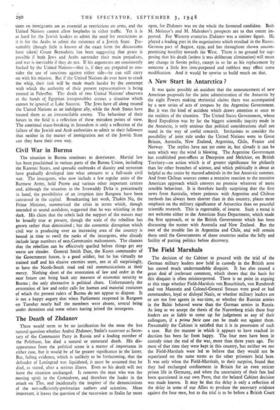Civil War in Burma
The situation in Burma continues to deteriorate. Martial law has been proclaimed in various parts of the Burma Union, including the Karenni States, and sporadic outbreaks of dacoity and terrorism have gradually developed into what amounts to a full-scale civil war. The insurgents, who now include a few regular units of the Burmese Army, hold Prome and various other important centres and, although the situation in the Irrawaddy Delta is precariously in hand, the possibilities of an irruption into Rangoon have been canvassed in the capital. Broadcasting last week, Thakin Nu, the Prime Minister, summarised the crisis in terms which, though intended to sound confident, suggested that he was whistling in the dark. His claim that the rebels lack the support of the masses may be broadly true at present, though the scale of the rebellion has grown rather than diminished ; but the economic disruption which civil war is producing over an increasing area of the country is bound in time to swell the ranks of the insurgents, who already include large numbers of noncommunist malcontents. The chances that the rebellion can be effectively quelled before things get any worse are slender. General Smith Dun, the Karen commander of the Government forces, is a good soldier, but he has virtually no trained staff and his elusive enemies seem, not at all surprisingly, to have the North-South road and rail communications at their mercy. Nothing short of the restoration of law and order in the near future can bring back any measure of economic security to Burma ; the only alternative is political chaos. Unfortunately the restoration of law and order calls for human and material resources of which the present rulers of Burma do not appear to dispose. It is not a happy augury that when Parliament reopened in Rangoon on Tuesday nearly half the members were absent, several being u-nder detention and some others having joined the insurgents. _


































 Previous page
Previous page